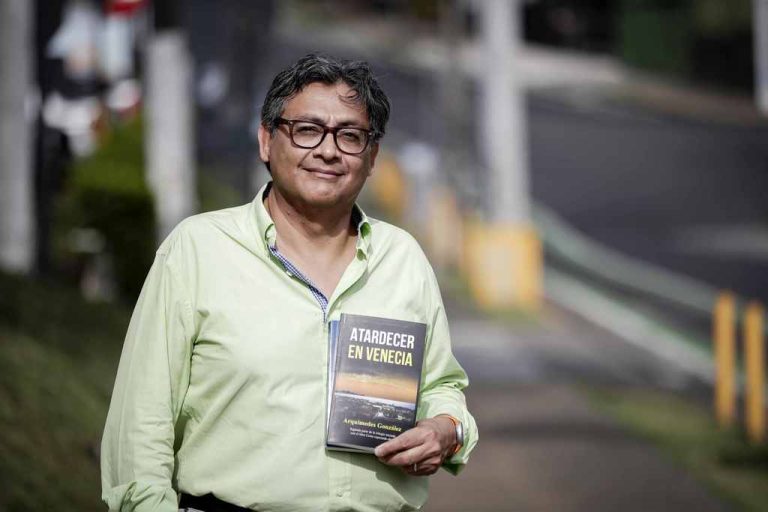24 de marzo 2024

Children of Exile: The Births “Sowing Hope” in the Camp of Nicaraguan Farmers

PUBLICIDAD 1M
PUBLICIDAD 4D
PUBLICIDAD 5D
The writer, exiled in Costa Rica, presents his new novel “Atardecer en Venecia”, the second in a trilogy set amid the crisis Nicaragua experiencing

Nicaraguan writer Arquimedes Gonzales displays his book Atardecer en Venecia. Photo: EFE
“This novel is full of villains, just like today’s Nicaragua which is full of villains who believe that justice will never reach them, that they’re going to go on this way forever,” exiled Nicaraguan writer Arquimedes Gonzales tells the Spanish-based EFE news agency. Gonzalez has chronicled the social reality of his country through his latest work, Atardecer en Venecia, currently available only in Spanish.
Born in Managua in 1972, Arquimedes Gonzalez tells his stories through fiction but with the rigor of a journalist, using these elements to portray “the origins of the dictatorship and its evils” in Nicaragua. He addresses the topic through his latest novel, Atardecer en Venecia, second of a trilogy that began with Como esperando Abril [“Ás if waiting for April”]. The latter was banned in Nicaragua by the government of Daniel Ortega.
In addition to unveiling a country that Ortega wants to hide, the novel presents a current problem: the world of narcotrafficking as the nerve and motor force of politics in the Americas. That was the view of the jury for the Juegos Florales Hispanoamericanos [“Hispanic-American Flower Games”] competition based in Quetzaltenango, Guatemala, who selected the book as one of its finalists.
The jury for the IV Medellin Noir Crime Novel Competition, has also named the book a finalist. The panel stated that it “constitutes a harsh portrait of the violence and gang culture in Nicaragua.”
The novel exposes the moral, structural, and cultural corruption of a society in crisis, which to the writer – who is also a journalist – is at the root of all the evil.
Gonzalez was formerly a professor of written journalism at Managua’s now-shuttered and confiscated Central American University (UCA). Among his former students is the current Miss Universe, Sheynnis Palacios.
Gonzalez will be presenting his book, already available online, on April 19th in Costa Rica.
The origins of Nicaragua’s implosion
“This second part begins prior to 2018, at the very beginning of the dictatorship’s evils. It then goes on to portray how we got to April 2018,” when massive anti-government demonstrations exploded – demonstrations that Ortega crushed through force, Gonzalez relates. He is the winner of the 2011-12 Rogelio Sinnan Central American Prize for Literature. To date, his best-known work has been La muerte del Aquario [“Death of the ‘Aquarian”] first published in 2005.
Nicaragua’s 2018 social explosion was triggered by corruption, the destruction of the country’s institutions, poverty, abuse of power, human rights violations, and drug trafficking, the author contends.
This current work is “a needed x-ray, to understand how we got to 2018. It’s also an x-ray of the Nicaragua that Daniel Ortega doesn’t want exposed in other countries, hence no one can go in and report what’s going on in that country now,” he explains.
Arquimedes Gonzalez, who is currently exiled from Nicaragua for the second time, doesn’t hesitate to point to drug-trafficking as having become “a real power in Nicaragua.”
In his book, the author demolishes the argument that Nicaragua is a “containment wall” against drug trafficking, by being the Central American country that seizes the lowest quantity of drugs.
“What the police do is seize money they find, curiously, abandoned on the street. That seems more like bribes that the drug traffickers leave for the benefit of the dictatorship,” he reasons.
Gonzalez, also the author of the 2009 book Tengo un mal presentimiento [“I have a bad feeling”], says that drug trafficking at the hands of the State also causes society to rot. He exposes this tendency through the fictitious characters in his books.
An “x-ray” of the country
Atardecer en Venecia is a “real x-ray of the Nicaragua we know, using fictitious characters but also incorporating real situations that occur, such as corruption, human rights violations, espionage, organized groups to attack civilians,” he explains.
He also tells of a government meeting that occurred in Managua’s Japanese Park on April 19, 2018, where the order was given to squash the anti-government demonstrations. The series of violent actions that followed left at least 355 dead, 4,000 wounded, and forced tens of thousands of Nicaraguans to flee into exile, some of them now left stateless and prohibited from returning.
Because of that, Arquimedes Gonzales confesses, “this novel is full of villains, just like Nicaragua today, that’s full of villains who believe that justice will never reach them, that they’re going to continue there forever.”
However, he clarifies that the novel isn’t trying to say that the “villains” are going to win, but rather that those who in power are the protagonists of the country’s evils, but one day justice will arrive.
That very hope for justice is what led the author to title the book “Nightfall in Venice.”
Nicaragua, he adds, is in a phase of total darkness: in terms of democracy, human rights, and accountability; with fraudulent elections and without strong institutions. The country is once again living through a long dark night, as Pope John Paul II termed the first Sandinista government (1979 – 1990).
In the end, though, the writer and journalism professor predicted, dawn will come again to Nicaragua.
This article was published in Spanish in Confidencial and translated by Havana Times. To get the most relevant news from our English coverage delivered straight to your inbox, subscribe to The Dispatch.
PUBLICIDAD 3M
Agencia de noticias internacional con sede en Madrid, España. Fundada en Burgos durante la guerra civil española en enero de 1939.
PUBLICIDAD 3D